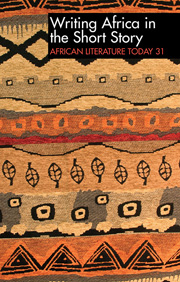Book contents
- Frontmatter
- Dedication: Chinua Achebe Joins the Ancestors
- Stop Press/ Tribute to Kofi Awoonor 1935–2013
- Contents
- Notes on Contributors
- Editorial Article
- Articles
- “Real Africa”/“Which Africa?”: The Critique of Mimetic Realism in Chimamanda Ngozi Adichie's Short Fiction
- Writing Apartheid: Miriam Tlali's Soweto Stories
- Articulations of Home & Muslim Indentity in the Short Stories of Leila Aboulela
- Ugandan Women in Contest with Reality: Mary K. Okurutu's A Women's Voice & the Women's Future
- Snapshots of the Botswana Nation: Bessie Head's The Collector of Treasures & Other Botswana Village Tales as a National Project
- Widowhood – Institutionalized Dead Weight to Personal Identity & Dignity: A Reading of Ifeoma Okoye's The Trial & Other Stories
- Feminist Censure of Marriage in Islamic Societies: A Thematic Analysis of Alifa Rifaat's Short Stories
- Diaspora Identities in Short Fiction by Chimamanda Ngozi Adichie & Sefi Atta
- Exposition of Apartheid South African Violence & Injustice in Alex la Guma's Short Stories
- Locating a Genre: Is Zimbabwe a Short Story Country?
- Mohammed Dib's Short Stories on the Memory of Algeria
- Ama Ata Aidoo's Short Stories: Empowering the African Girl-Child
- Ama Ata Aidoo: an Interview for ALT
- Reviews
Snapshots of the Botswana Nation: Bessie Head's The Collector of Treasures & Other Botswana Village Tales as a National Project
from Articles
Published online by Cambridge University Press: 05 December 2013
- Frontmatter
- Dedication: Chinua Achebe Joins the Ancestors
- Stop Press/ Tribute to Kofi Awoonor 1935–2013
- Contents
- Notes on Contributors
- Editorial Article
- Articles
- “Real Africa”/“Which Africa?”: The Critique of Mimetic Realism in Chimamanda Ngozi Adichie's Short Fiction
- Writing Apartheid: Miriam Tlali's Soweto Stories
- Articulations of Home & Muslim Indentity in the Short Stories of Leila Aboulela
- Ugandan Women in Contest with Reality: Mary K. Okurutu's A Women's Voice & the Women's Future
- Snapshots of the Botswana Nation: Bessie Head's The Collector of Treasures & Other Botswana Village Tales as a National Project
- Widowhood – Institutionalized Dead Weight to Personal Identity & Dignity: A Reading of Ifeoma Okoye's The Trial & Other Stories
- Feminist Censure of Marriage in Islamic Societies: A Thematic Analysis of Alifa Rifaat's Short Stories
- Diaspora Identities in Short Fiction by Chimamanda Ngozi Adichie & Sefi Atta
- Exposition of Apartheid South African Violence & Injustice in Alex la Guma's Short Stories
- Locating a Genre: Is Zimbabwe a Short Story Country?
- Mohammed Dib's Short Stories on the Memory of Algeria
- Ama Ata Aidoo's Short Stories: Empowering the African Girl-Child
- Ama Ata Aidoo: an Interview for ALT
- Reviews
Summary
My work was always tentative because it was always so completely new (…) it brought all kinds of people, both literate and semi-literate, together, and it did not really qualify who was who — everyone had a place in my world.
(Head 1977, 45)Bessie Head's collection of short stories, The Collector of Treasures, signalled a shift in her writing which became, in her own words, ‘more social and outward-looking’ (Head 2007: 102). Head has described her earlier works as ‘stating personal choices’ expressed through the construction of ‘[m]anipulated characters [who] talk anxiously for the author’. The anxieties that Head alludes to are well documented in her biographical and epistolary writings; a product of an interracial relationship born into a prominent white family in apartheid South Africa, as well as the breakdown of her marriage and her life in exile in Botswana. She initially wrote literature as a cathartic expression of her troubles. Her characterization stemmed from an inward-looking anguish. The process of writing The Collector of Treasures was distinct from her previous writings as the stories were ‘undoubtedly written over a longer period than her novels’ (Ibrahim 1996: 171). The collection came to represent a ‘resumé of 13 years of living entirely in village life’ (Beard 1986: 45) rather than a specific chapter in Head's life. The movement into a more ‘outward-looking’ literature signified that ‘the stories were written after she had found a home in Botswana’ (Ibrahim 1996: 171).
- Type
- Chapter
- Information
- Writing Africa in the Short Story , pp. 65 - 76Publisher: Boydell & BrewerPrint publication year: 2013

